- Home
- Gavin Chappell
The Londinium File
The Londinium File Read online
The Londinium File
GAVIN CHAPPELL
Copyright © Gavin Chappell 2019
Cover art by James Anderson
All rights reserved. No part of this book may be reproduced or transmitted in any form or by any electronic or mechanical means, including photocopying, recording or by any information retrieval system, without the written permission of the publisher and author, except where permitted by law.
The right of Gavin Chappell to be identified as the author of this work has been asserted by him in accordance with the Copyright, Designs and Patents Act 1988.
Published by Schlock! Publications 2019
ISBN: 9781073323586
This book is a work of fiction and any similarities to actual persons and/or places are purely coincidental.
Schlock! Publications
www.schlock.co.uk
In the same series:
On Hadrian’s Secret Service
Murder in Hadrian’s Villa
The Hadrian Legacy
Our Man in Alexandria
The Games of Hadrian: The Gladiator Gambit
The Games of Hadrian: The Archimedes Stratagem
The Kingdom that Rome Forgot
And by the same author:
Crocodile and Leopard
The Man Who Sold the Roman Empire
Prologue
Old Sarmizegethusa, Dacia, February 125 AD
As the centurion whirled round, the descending sword blade glittered in the sunlight from the cave mouth. He leapt to one side, his foot twisting on the wet rock, and had to seize the wall of the cave to stop himself falling flat.
Two men confronted him, swords in their hands, their faces and bodies in darkness. They must have crept up on him as he was conducting his fruitless search of the cave. But why had they attacked?
He drew his own sword and faced them stolidly.
‘Who sent you?’ he rumbled, his breath turning to steam in the chill subterranean air. ‘What do you want?’
‘Your death!’ hissed one, and came at him with his sword.
The cave echoed with the clang of blade on blade as the centurion lifted his own sword to parry the attack. Now both came at him at the same time, cutting at him from left and right like dogs trying to bring down a bear at bay. Sparks flared in the darkness, illuminating the men’s faces. He could see that they were Romans like himself.
‘Who are you working for?’ he demanded. But they were not likely to answer his questions. He had to get away. There was nothing to see down here, after all. But perhaps the presence of his attackers, who must have followed him all the way from the fort, represented the best clue he had found in a long time. He had to get away and report this latest development to the Chief.
With a wild roar, he charged at them, cloak wrapped round his left hand as shield, short sword flashing back and forth. One blow found its mark, and the centurion felt his blade cut into flesh, and heard a cry from his attacker.
The other dodged the centurion’s attack, then hacked at him as he blundered out through the cave mouth. The centurion felt a white hot blaze of agony from his side, and then he was out in the cold winter sunlight, scrambling precipitately down the rocky slope towards the silver thread of the river as it wound its way through the pines.
Halfway down the snow-mantled slope he looked back, having paused to clean and sheathe his sword. One man stood in the cave mouth, watching his descent, but making no move to follow. The centurion guessed he was torn between pursuit and tending for his wounded comrade. Perhaps they had really only intended to scare him away, not to kill him.
He reached the bottom, and saw two more horses tethered to a tree not far from where he had left his own. All three animals watched him as he staggered up through the snow, neighing questioningly as he drew closer. Even his own mount shied away from him. He put his hand to his side and felt it sticky with blood.
A clatter from behind him alerted him and he swung round to see the two men scrambling down the slope after him. In daylight he saw that both had military haircuts and wore the belts of Roman legionaries. They were after him. They meant to kill him.
Staggering over to the other two horses, he quickly cut their tethers then went to his own, mounted hastily and rode from the clearing as the other two horses galloped away into the trees. As he turned the bend he looked back to see his two attackers running excitedly after their errant steeds.
Now all he needed was to take advantage of the opportunity this afforded him to put enough miles between him and his mysterious attackers and return to civilisation.
Two Roman legionaries had attacked him while he was investigating the cave he had heard about. Why was that? Surely nothing remained of the gold. It was over twenty years since it had been taken—wasn’t it? Except that what he had learnt recently suggested that some of it might have mouldered there rather longer.
And it also seemed that someone with authority in these parts was keeping an eye on the area. He remembered the dossier of information he had sent back to the Chief. He had heard nothing from Rome since.
He rode on, feeling very much alone. His horse’s hoof steps echoed back eerily from the snow hung pines. He knew there was a conspiracy. He had only scratched the surface of it. But surely the Chief himself was not involved!
He reached Apulum after a long ride, and after stabling his horse went immediately to his office in the fort. Here his legionary clerk greeted him.
‘You’ve received a coded message, sir,’ he said, eying the blood crusted bandage on his side. ‘From Rome.’
Scowling, Centurion Junius Italicus tore open the message tablet. After a moment deciphering it, he looked up.
‘I’m being recalled,’ he said in wonder. ‘Extreme urgency, it says. I must inform the legate at once.’
He turned and strode from the office.
Book One: The Dacia Dossier
— 1—
Portus Trajanorum, Italy, March 125 AD
The moment Gaius Flaminius Drusus disembarked from his ship, he knew that trouble was brewing.
The bustling port near the Tiber’s mouth was a new town, having replaced Ostia, which remained as a ghost-town only a mile or two away. From Portus Trajanorum it was possible to travel by road or river up to Rome.
The buildings of the port had yet to accumulate that patina of soot and grime that characterised Ostia, a town that was founded, oooh, Flaminius didn’t know when. Long before the days of the Emperor Hadrian, that was for sure. The crowds that thronged the harbour, rolling like rivers of humanity towards the ships or into town, were a heterogeneous assortment of Roman citizens, both civil and military, peregrines, and barbarians from the furthest ends of the empire and beyond. Gauls and Syrians, Greeks and Egyptians, Germans and Parthians, all passed Flaminius by as he hovered indecisively at the foot of the gangplank.
More passengers were attempting to disembark, several Egyptians and a couple of Africans who had been picked up on the voyage from Alexandria; Flaminius realised he was blocking their route. Muttering apologies, he moved out of their way and went to sit on a bollard by the edge of the wharf. Ruefully he looked up at the hot March sun and mopped his brow.
His face had been tanned dark by southern suns. Two crowded years had passed since he had last see Rome and Italy. He remembered that the day of his departure had been dark and murky, autumnal. He had spent so long in Egypt and the lands surrounding it, growing accustomed to the glare of the sun, the heat of the spicy air, the sting of the desert sands, that when the call to return to Rome had reached him he had thought only of the cooler temperatures of his native country. Of course, he had to come ashore on a day like this.
He glanced round for a fountain to wet his mouth. There
was one by the wall of that warehouse.
He rose, shouldering his pack which contained the bare minimum of possessions needed on the voyage, and jostled his way to the wall. Picking up the chained metal cup, he dunked it in the bowl, and poured the contents first down his dry throat, then over his face and hair. Blinking, shaking his head to rid it of the remaining drops, he glanced around again. He leant his pack against the wall, then himself, and once more studied his surroundings. There should have been someone waiting for him.
Why had no one come to greet him at the gangplank?
After requisitioning a berth aboard the galley Scylla, where she had been moored in the Great Harbour of Alexandria, he had sent a coded signal to Rome with details of his ship’s scheduled arrival in Italy. Despite delays caused by contrary winds as they neared the Straits of Messina, he had reached Portus as per schedule. And yet nobody had come to meet him.
Flaminius shook his head. Chief Centurion Probus was getting lax in his old age!
And yet the summons had seemed pressing enough. It had to be, for Flaminius to be required back in Rome; his secondment to Egypt had been a hardship posting. Things had gone badly wrong in Britain[1], and Flaminius had embarrassed his chief. Now it seemed all that was forgotten. Or had he somehow misinterpreted the message he’d received?
He had destroyed it on reading it, but before that he had memorised its contents, in accordance with his training. Report yourself to me at your earliest convenience… extreme urgency… Inform your legate that your replacement will be despatched forthwith…
And that, apart from a cursory salutation identifying writer and recipient, had been pretty much that. The imperative tone had been marked. Flaminius had reported his immediate departure to his legate, Avidius Pollio, and taken himself down to the harbour where he had shown to the skipper of the first likely looking Rome-bound vessel his lance-head brooch, insignia of a member of the Commissary, the imperial secret service, blithely commandeering the best berth aboard.
The voyage had been spent in comfort, at the skipper’s expense, as far as was possible. Like most pure blooded Roman citizens, Flaminius was no sailor, and he had remained in his cabin for the first few days of a journey which had taken almost three weeks of sail, via Crete, Greece, and Sicily. The last stretch, north to Rome across the Tyrrhenian Sea, had been a pleasure cruise by comparison, and during the last few days the captain had done his best to ingratiate himself with his imperial guest.
Flaminius had warmed to him, and before disembarking there had been quite a sentimental parting; Flaminius had promised to travel on the Scylla again, next time he had the need to sail between Rome and Egypt. Not that he ever hoped to return to that dark and sinister land. He had much to get away from. If he never saw a certain kohl-eyed Egyptian girl or her brother-husband, it would not break his heart…
Flaminius pushed himself away from the wall and sighed. All these reminiscences were getting him nowhere. He was meant to be meeting with Probus today at the Peregrine Camp on the Caelian Hill. It was getting close to noon. If no one was waiting for him with a fresh horse or a river barge bound upstream, he would have to organise these things for himself. With satisfaction he tapped the brooch pinned to his civilian tunic. Ever since he first joined the Commissary, it had opened plenty of doors for him. He set off into town.
The Commissary’s existence, or rather its true identity, was a secret known to all but a few high ranking senators and imperial officials. The brooch was recognised on all the roads of the empire, but it was identical to that worn by an imperial courier, giving the right to requisition civilian transport, to spend the night gratis in an imperial waystation, plus any number of other privileges. But the Commissary was a whispered rumour to any citizen who had ‘followed the eagles’ in Flaminius senior’s pompous phrase—served in the legions. Not that his father ever had done; he had seen it as a sign of young Gaius’ failure to excel in his legal studies when his son took on the post as a tribune of auxiliary cavalry all those years ago…
Flaminius paused mid step. He had got away from the bustling throngs in the main street and was proceeding down a narrow alleyway towards a spot where he knew horses could be hired—or requisitioned. It had been dead silent apart from the distant murmur of the crowd. But then he heard a stealthy footfall.
He knelt as if to adjust a sandal strap, and took this as an opportunity to peer back down the alley. It was empty. Anonymous doors, their paint flaking in the spring sun, led off into buildings on either side, but otherwise the alley was bare but for the detritus common to Roman thoroughfares: a few fragments of amphora in a drying puddle, broken pieces of wood, a stained strip of pale linen. Nothing to explain the sound. But when Flaminius covertly scanned the doors, his eyes narrowed, as one of them settled into place.
He rose hastily. If someone was following him, well, no doubt they had their reasons. He slid a hand under his tunic to ensure that his hidden short sword was easily to hand, and stalked away.
He preferred the long sword, with which he had become familiar during his early days in the auxiliary cavalry. Even after joining the Commissary, he had habitually used a long sword, often to good effect in his line of work. But returning to Rome in such a hurry, he had decided to take a weapon that he could wear under his tunic, in a hidden sheath. Weapons were forbidden within the sacred precincts of Rome, and no one wished to break the ancient and time honoured laws laid down by Romulus himself—not openly, at least.
Shortly afterwards, the alleyway opened out into another bustling section of town and Flaminius saw the horse coper’s shop that was his destination on the far side of the street. He strode boldly towards it, pausing only to glance over his shoulder. Still he saw no sign of anyone following him. Dismissing his fears—such anxieties went with the job—he entered the horse coper’s and flashed his insignia. Shortly afterwards he had a beast sturdy enough to satisfy him for the ride to Rome.
An hour later, riding up the Port Way, the road that led up the Tiber valley to the very walls of Rome, he was too busy negotiating the traffic, foot, mounted, and wheeled, to consider that he might have anyone on his trail. It was too busy to be sure, anyway. Although the road network which spanned the entire empire from Hadrian’s new Wall in the north of Britain to the desert sands of the oasis of Ammon had been built with the legions in mind, in peaceful Italy, at least, they were used chiefly by civilian traffic.
As he reached a hilly section, his mind was cast back some years; he remembered the attack he had received at the hands of disguised barbarian warriors, who had raided a wages train bound for the Praetorian camp. But no such excitement was to trouble his journey today, and when he finally reached Rome herself, lying resplendent at dusk upon the Seven Hills, he felt only the exhilaration of the returning exile.
He sat his horse by the side of the road, gazing raptly at the distant city, the palaces and the temples, the tenements and the hovels. The huge Flavian Amphitheatre—the so-called Colosseum—seemed to dominate the skyline, the Colossus of Nero that gave it its popular name winking roguishly in the last rays of the setting sun.
Down there was the Circus Maximus, in the valley between the Aventine and the Palatine, where Flaminius had spent much of his days as a student, a young lad really, down from the hills with an allowance to burn. He’d spent plenty of time—and money—at the amphitheatre too, although in more recent years he had learnt to see the gladiator’s life from a fresh perspective.
The Roman Forum was out of sight, hidden from view by the Palatine Hill and the great complex of palaces that stood atop it. From here Flaminius could make out the high arches of the Appian Aqueduct that transported water into the City from the hills to the House of Augustus. The remainder of the palaces were dwarfed by the House of Augustus, but he could see the House of Tiberius too.
There was the Capitoline on the left, that ancient hillfort where the Romans had long ago been besieged by the barbarian Gauls. And there, on the right, if he followed the line
of the aqueduct… the slopes of the Caelian Hill, and atop it the fortress known as the Peregrine Camp, central base of the Commissary.
But it was too late to be calling on Probus today: the Chief went to bed early, just as he rose at daybreak. Darkness was falling in the Forum of Rome as Flaminius rode up the Vicus Tuscus, along the narrow valley between the palaces of the Palatine and the temples of the Capitoline. All riding was banned within Rome’s confines during hours of darkness, and as he sawed at the reins to pass round a litter borne by two hulking Gauls, Flaminius realised that he would have to find somewhere to sleep for the night.
If he went up to the Camp, he would be able to find sleeping quarters; even if he met no one he recognised. But he it had been a long voyage, followed by a tiring ride up the Tiber Valley, and right now Flaminius felt a need to unwind, to relax. However urgently his presence was needed, it could wait until morning. After all, whatever it was, it could hardly be all so great a threat to the empire if Probus had forgotten to send someone to meet him.
He would find himself a room for the night in the City, Flaminius told himself, swig a cup or three of wine in a wine shop, and trot up the Caelian to the Peregrine Camp in the morning, when Probus was up and about. Maybe if Flaminius was lucky, he’d find himself sweet company to help rid him of the ache of his tired limbs, his tired heart… Help him to forget Nitocris, Dido. Medea… Drustica.
After receiving unwanted attention from a foot patrol of City Guard, he dismounted and led his horse through the Forum, passing basilicas and temples on his way to less salubrious districts. The twilit air hung heavy with incense and the smoke of the evening sacrifice, which mingled with the profane reek of wood fires and cooking food from the far side of the Forum.

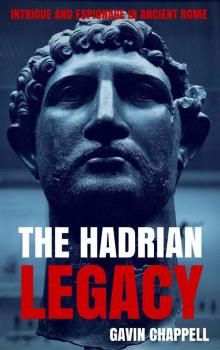 The Hadrian Legacy
The Hadrian Legacy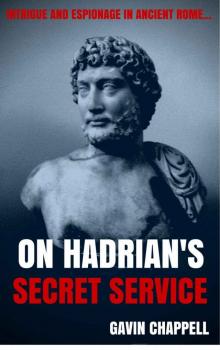 On Hadrian's Secret Service
On Hadrian's Secret Service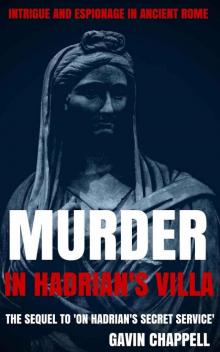 Murder in Hadrian's Villa
Murder in Hadrian's Villa The Sword of Wayland
The Sword of Wayland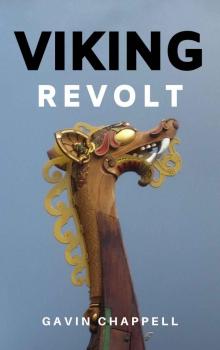 Viking Revolt
Viking Revolt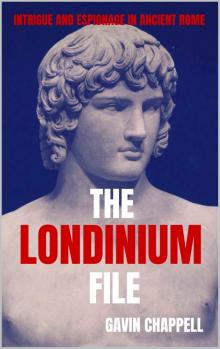 The Londinium File
The Londinium File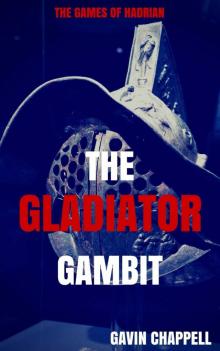 The Gladiator Gambit
The Gladiator Gambit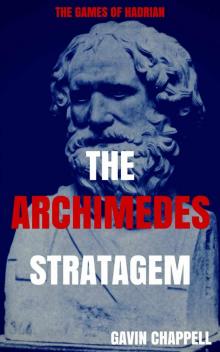 The Archimedes Stratagem
The Archimedes Stratagem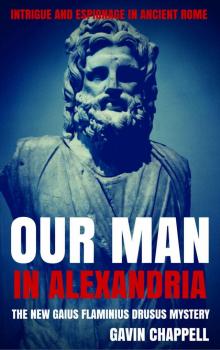 Our Man in Alexandria
Our Man in Alexandria Into the Void (The Dungeoneers)
Into the Void (The Dungeoneers)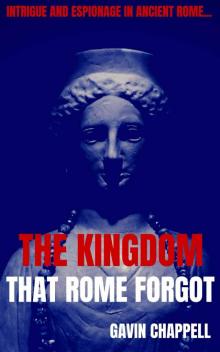 The Kingdom That Rome Forgot
The Kingdom That Rome Forgot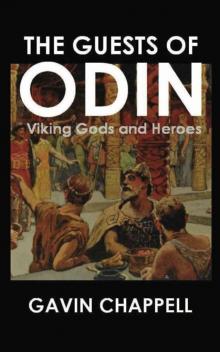 The Guests of Odin
The Guests of Odin